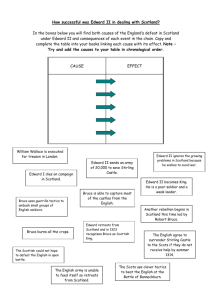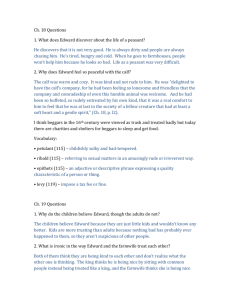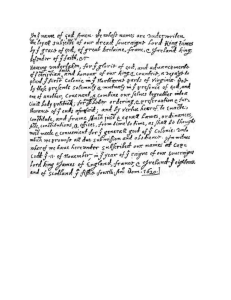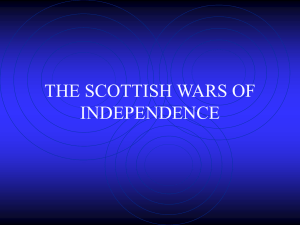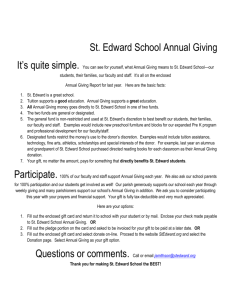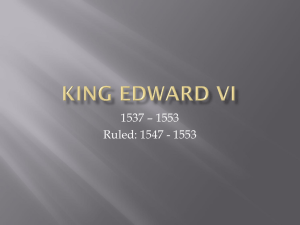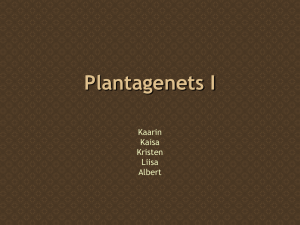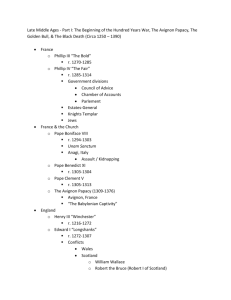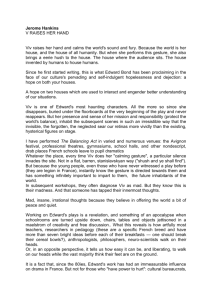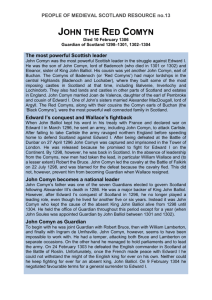Time-line on the First War of Independence: the reign of King John
advertisement
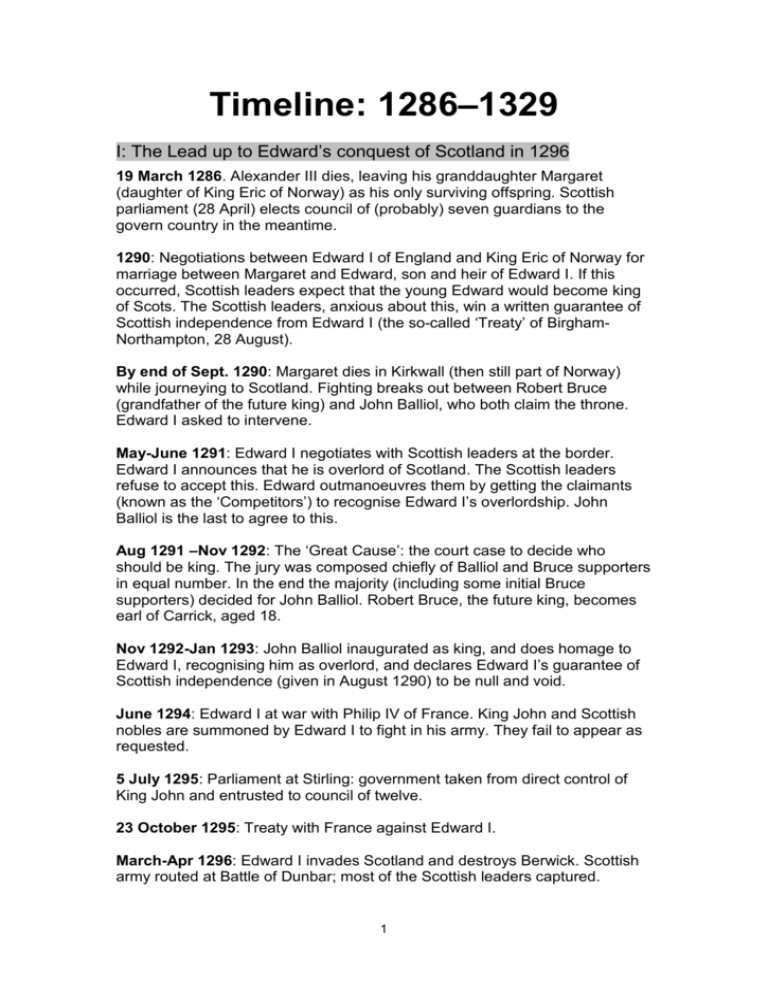
Timeline: 1286–1329 I: The Lead up to Edward’s conquest of Scotland in 1296 19 March 1286. Alexander III dies, leaving his granddaughter Margaret (daughter of King Eric of Norway) as his only surviving offspring. Scottish parliament (28 April) elects council of (probably) seven guardians to the govern country in the meantime. 1290: Negotiations between Edward I of England and King Eric of Norway for marriage between Margaret and Edward, son and heir of Edward I. If this occurred, Scottish leaders expect that the young Edward would become king of Scots. The Scottish leaders, anxious about this, win a written guarantee of Scottish independence from Edward I (the so-called ‘Treaty’ of BirghamNorthampton, 28 August). By end of Sept. 1290: Margaret dies in Kirkwall (then still part of Norway) while journeying to Scotland. Fighting breaks out between Robert Bruce (grandfather of the future king) and John Balliol, who both claim the throne. Edward I asked to intervene. May-June 1291: Edward I negotiates with Scottish leaders at the border. Edward I announces that he is overlord of Scotland. The Scottish leaders refuse to accept this. Edward outmanoeuvres them by getting the claimants (known as the ‘Competitors’) to recognise Edward I’s overlordship. John Balliol is the last to agree to this. Aug 1291 –Nov 1292: The ‘Great Cause’: the court case to decide who should be king. The jury was composed chiefly of Balliol and Bruce supporters in equal number. In the end the majority (including some initial Bruce supporters) decided for John Balliol. Robert Bruce, the future king, becomes earl of Carrick, aged 18. Nov 1292-Jan 1293: John Balliol inaugurated as king, and does homage to Edward I, recognising him as overlord, and declares Edward I’s guarantee of Scottish independence (given in August 1290) to be null and void. June 1294: Edward I at war with Philip IV of France. King John and Scottish nobles are summoned by Edward I to fight in his army. They fail to appear as requested. 5 July 1295: Parliament at Stirling: government taken from direct control of King John and entrusted to council of twelve. 23 October 1295: Treaty with France against Edward I. March-Apr 1296: Edward I invades Scotland and destroys Berwick. Scottish army routed at Battle of Dunbar; most of the Scottish leaders captured. 1 July 1296: Surrender and submission of King John Balliol. In Edward I’s eyes Scotland has ceased to be a kingdom. The inauguration stone (‘Stone of Destiny’) taken from Scone to Westminster. Edward completes triumphant progress around Scotland, reaching as far north as Elgin. 28 August 1296: More than 1,600 Scots come to Berwick to give their loyalty to Edward I as their ruler. This is later written up as the ‘Ragman Roll’. II: Resistance to Edward I in the name of King John Balliol, 1297– 1304 1297: Edward I in dire need of money for his war against the king of France, makes demands that nearly trigger revolt in England and provokes a rising across Scotland. 3 May 1297: Sir Richard of Lundie and William Wallace kill the sheriff of Lanark. 11 Sept 1297: Wallace and Andrew Moray defeat English at Stirling Bridge. All but SE Scotland liberated. Moray dies. Wallace becomes Guardian in name of King John. 22 July 1298: Battle of Falkirk. Edward I defeats Wallace’s army, but he is unable to advance further. Only parts of southern Scotland are restored to English rule. By end of 1298: Wallace resigns as Guardian. The new Guardians are John Comyn the younger of Badenoch, and Robert Bruce, earl of Carrick (the future king). 1299: Lamberton bishop of St Andrews appointed chief Guardian. Scots take Stirling. 10 May 1300: Bruce resigns as a Guardian and is replaced by Ingram de Umfraville. Summer 1300: Edward I campaigns in Galloway. Most of Scotland still held by Guardians in name of King John, who is released by Edward I into papal custody. 1301: John Soules appointed sole Guardian. King John transferred to his ancestral castle at Bailleul in Picardy. His return to Scotland planned. Edward I takes Bothwell. Beginning of 1302: Robert Bruce, earl of Carrick, fearful of King John’s return, submits to Edward I, and marries daughter of the Anglo-Irish earl of Ulster. 2 11 July 1302: French defeated by Flemish at Battle of Courtrai. French now want peace with Edward I, and are no longer willing to support King John’s return. 24 Feb 1303: Battle of Roslin. John Comyn defeats English force from Edinburgh. May 1303: The king of France makes peace with Edward I, leaving the Scots out in the cold. Edward I invades Scotland, overwintering for first time (at Linlithgow). 9 Feb 1304: Final surrender of Comyn and others governing in King John’s name. 21 April 1304: Robert Bruce earl of Carrick (the future king) becomes head of the Bruce family on his father’s death. He can now lead the Bruce claim to the throne. 11 June 1304: Robert Bruce forms secret alliance with the bishop of St Andrews. 20 July 1304: Fall of Stirling castle. 23 August 1305: Execution of Wallace at Smithfield in London. 15 Sept 1305: Ordinance for Government of Scotland in Westminster parliament. III: Civil war and independence: Bruce v. Balliol/Comyn, 1306– 1329 10 February 1306: Robert Bruce kills John Comyn in Dumfries 25 March 1306: Robert Bruce inaugurated as king at Scone. 19 June 1306: Robert I defeated at Battle of Methven. Members of his family and many supporters are captured and executed. He flees west with a small band. Spring 1307: Robert I returns to Carrick; wins Battle of Loudoun Hill. 7 July 1307: Edward I dies on Solway Firth while leading an army to crush Robert I. May 1308: Robert I destroys Comyn heartland of Buchan. August 1308: Macdougall, a Comyn/Balliol supporter, defeated at Battle of Brander. 3 31 Oct 1308: Another Comyn/Balliol supporter, the earl of Ross, submits to Robert I. 16-17 March 1309: Robert I consolidates his position after his victories in the civil war by holding a parliament at St Andrews. Sept 1310-Aug 1311: Edward II invades, but spends 10 months in Berwick. Aug & Sept 1311: Robert I leads his first raids into northern England. January 1313: Robert I takes Perth and slaughters inhabitants. Spring 1314: Roxburgh and Edinburgh castles taken for Robert I. 23-24 June 1314: Battle of Bannockburn. Nov 1314: Cambuskenneth parliament: no-one to have land in Scotland and England. 1315-18: Edward Bruce campaigns in Ireland as king of Ireland. His death leaves Robert I with only the infant Robert Stewart, son of his daughter Marjory, as heir. 1318: Edward Balliol, son of King John (who had died in 1314), arrives in England. 6 April 1320: The Declaration of Arbroath. 4 Aug 1320: Plot to kill Robert I and make Edward Balliol king brutally suppressed. April 1326: Treaty of Corbeil with France. 17 March 1328: Treaty of Edinburgh. Formal recognition of Scottish independence and Robert Bruce as king. Edward III, not yet old enough to rule, disapproves. 7 June 1329: Death of Robert I. Days later the pope grants the honour of coronation and anointment to Scottish kings. 4
